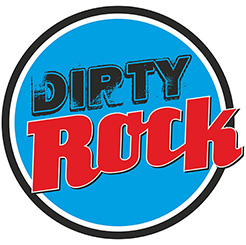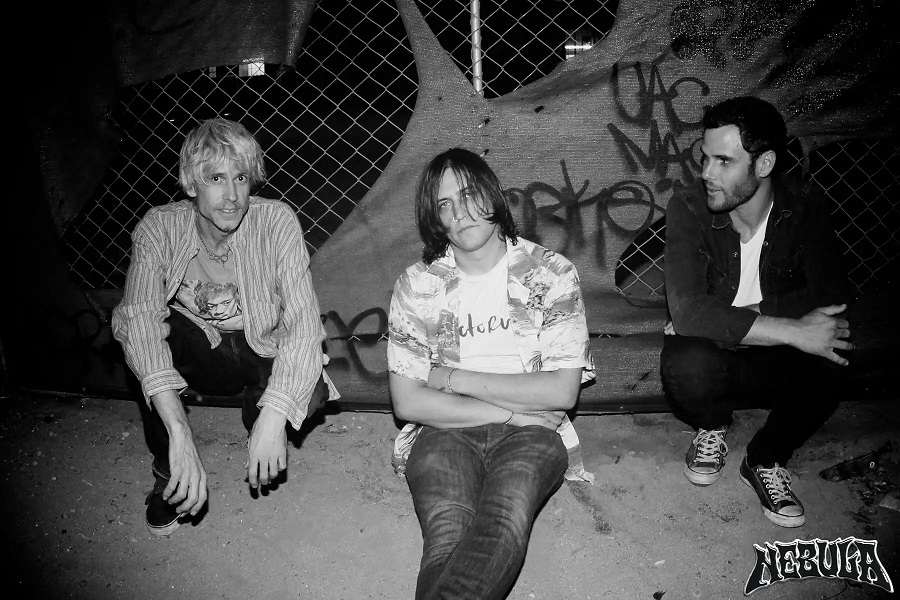¿Qué tienen en común Fu Manchu, Mudhoney, un baterista convertido en shredder y el Mojave? Una palabra: NEBULA.
What do the Desert Rock Trifecta, a drummer-turned-shredder, Mudhoney and the Mojave Desert have in common? One word: NEBULA.
Se puede decir que todo comenzó con tres de los titanes del desert rock: Kyuss, Fu Manchu y Monster Magnet. Hace algún tiempo, Ruben Romano (Nebula, Fu Manchu, The Freeks) y Brant Bjork (Kyuss, Fatso Jetson, Fu Manchu, Mondo Generator, Sons Of Kyuss, Stöner…) tenían el mismo mánager y, aparentemente, un día, se le ocurrió a Romano regalarle a Bjork una copia del apabullante ‘Spine of God’ de los Monster Magnet.
Bjork, por su parte, decidió pasarle algo del material de Fu Manchu a Dave Wyndorf, fundador de Monster Magnet. Y si sabes algo de historia musical, sabrás que más tarde, Bjork formaría parte del épico grupo Kyuss, tocando desde entonces con una larga lista de los íconos más legendarios del desierto (Josh Homme, John Garcia, Nick Oliveri, Scott Reeder…).
Así, la rueda comenzó a girar, e igual que las arenas del desierto, los músicos se mezclaron entre ellos, formando lo que ahora se conoce como ‘desert rock’ (rock desértico) o el ‘stoner rock’ (rock ‘fumeta’).
I guess it all started with what is widely known as the ‘Desert Rock Trifecta’: in other words, Kyuss, Fu Manchu and Monster Magnet. Back in the day, Ruben Romano (Nebula, Fu Manchu, The Freeks) and Brant Bjork (Kyuss, Fatso Jetson, Fu Manchu, Mondo Generator, Sons Of Kyuss, Stöner…) had the same management and, allegedly, it was Ruben who first introduced Brant to Monster Magnet’s famed ‘Spine of God’.
Brant would later give Monster Magnet head honcho, Dave Wyndorf, some of Fu Manchu’s material and anyone who knows anything about music history knows that Brant would go on to form the legendary Kyuss and play with a veritable “Who’s Who” list of desert icons (Josh Homme, John Garcia, Nick Oliveri, Scott Reeder…).
Thus, the wheel began to spin, as the musicians and the desert sands fused together, forming what is now known as ‘desert rock’ or ‘stoner rock’.
Creo que el movimiento stoner-rock está guay, pero no creo que ningún artista vaya a decir: ‘Sí, soy rockero fumeta’. Quiero decir, si eres un músico que bebe cerveza, ¿te convierte en ‘rockero cervecero’?
Por cierto, ¿quién coño ha dicho ‘stoner’? Eddie Glass, cantante, guitarrista y el único miembro original que queda de Nebula, dijo una vez que no se considera un artista ‘stoner’: «Creo que el movimiento stoner-rock está guay, pero no creo que ningún artista vaya a decir: ‘Sí, soy rockero fumeta’. Quiero decir, si eres un músico que bebe cerveza, ¿te convierte en ‘rockero cervecero’?»
Según Romano, «fueron los medios los que acuñaron el término ‘stoner rock’, porque en los 90, todos seguimos siendo unos melenudos que fumaban marihuana».
Y ¿lo de “desert”? Pues porque ahí es donde todo empezó.
By the way, who the hell said ‘stoner’ anyway? Eddie Glass, singer, guitarist and the only remaining original member of Nebula, once said that he doesn’t consider himself a ‘stoner-rock’ artist: “I think the whole stoner-rock movement is a cool movement, of course, but I don’t think any artist is going to be like, ‘Yeah, that’s what I am.’ I mean, if you drink beer when you play music, does that make you a ‘beer rocker’?”
According to Romano, “It was the media that tagged the term ‘stoner rock’” because they all came out of the 80’s and into the 90’s with their long hair and still smoking pot.
As for the ‘desert’ part, well, that’s just where it basically all started…
Hablando de esa comunidad tan interconectada y tan conectada con el desierto, a Bjork se le atribuye haber coproducido el debut de Fu Manchu en 1994, ‘No One Rides For Free’, incluso dos años antes de que se hiciera cargo de los tambores en Fu cuando Eddie Glass y el baterista Ruben Romano se marcharon. En ese momento, la separación parecía devastadora, pero de repente, apareció el lado positivo: surgió Nebula, una banda heavy-psych de ‘power rock’ de Los Ángeles.
Speaking about the interconnected desert community, Brant is credited as having co-produced Fu Manchu’s 1994 debut ‘No One Rides For Free’ two years before he took over the drums in Fu when Eddie Glass and drummer Ruben Romano left. What at first seemed like a devastating split had a silver lining: Nebula, a ‘heavy-psych’ ‘power rock’ band out of Los Angeles, was born.
Siempre intento alejarme de las etiquetas porque suelen ser sacos muy generalizados donde la gente mete todo tipo de sonidos que (a veces) no tienen nada que ver, pero es cierto que ayuda a orientar a los nuevos oyentes. En este caso, digo ‘heavy psych’ porque trabajan con los herculanos Heavy Psych Sounds Records, y ‘power rock’, porque según el difunto Dickie Petersen de Blue Cheer, así debería llamarse. Y para mí, cualquier cosa que Dickie haya dicho alguna vez, va a misa.
I usually try to stay away from labeling, but in this case, I chose ‘heavy psych’ because they’ve released a few albums with psychedelic giants Heavy Psych Sounds Records, and ‘power rock’, because according to the late and great Dickie Petersen of Blue Cheer, that’s what it should be called. And in my book, whatever Dickie has ever said, goes.
Ahora que lo de rock desértico ha quedado claro, ¿qué tiene que ver todo esto con Seattle? Pues, por un lado, el primer grupo de Eddie Glass, Olivelawn, una banda de punk rock de San Diego, estuvo de gira con Nirvana y tuvo mucho trato con los pioneros del movimiento grunge, Mudhoney. Mientras los amigos de Nirvana, Soundgarden y Green River se volvían ‘grunge’ en Seattle, Eddie Glass et al. seguían fumando en California, convirtiéndose en piezas fundamentales de la máquina del desierto/stoner.
Now that the ‘desert rock’ implication is clear, what does any of this have to do with rainy Seattle? For one, frontman Eddie Glass’ early group, Olivelawn, a punk rock band from San Diego, toured with Nirvana and had close ties with grunge pioneers Mudhoney. While close-knit bands like Nirvana, Soundgarden and Green River were getting ‘grungy’ in Seattle, Eddie Glass et. al were getting stoned in California, becoming fundamental cogs in the ‘desert/stoner’ machine.
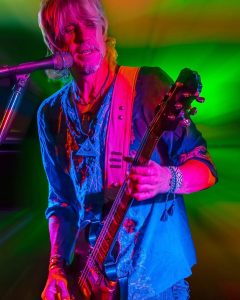
Por otro lado, todos estos vínculos con tantos artistas, productores y sellos diferentes han ayudado a forjar el sonido único de Nebula. El rock and roll, como todas las grandes artes, está en constante evolución. El arte de Nebula no es una excepción.
Eddie Glass y Ruben Romano aprovecharon su nueva libertad después de su salida de Fu Manchu y grabaron su primer EP, ‘Let It Burn’, un debut crudo y maravilloso grabado en el famoso Rancho de la Luna de Joshua Tree. No querían canciones de 2 o 3 minutos que acabaran en la radio, sino un rock duro y feroz que te derritiera la cara.
On the other hand, all of these connections with so many different artists, producers and labels have helped forge Nebula’s unique sound. Rock and roll, like all great art forms, is constantly evolving. Nebula is no exception.
Nebula took advantage of their newly-found freedom after the Fu Manchu split and recorded their raw, live-sounding EP debut ‘Let It Burn’ at Joshua Tree’s famed Rancho de la Luna. They didn’t want 2 or 3 minute songs that would end up on the radio, but instead, ferocious hard rock that would melt your face off.
Después de una extensa gira, llegó el momento de que el trío editara su primer LP. Se instalaron en Seattle – más bien en el sótano de Mark Arm (Mudhoney, Green River) y firmaron con Sub Pop, el sello grunge por excelencia. Poco después, editaron ‘To The Center’ y ‘Charged’, y el fuzz empezó a manifestarse.
Desde los tritonos Sabbathianos de Fu (omnipresentes en casi toda la música ‘heavy’), hasta la caótica energía garajera rollo Iggy y MC-5 en su primer EP (escucha “Devil’s Liquid” arriba), el sonido de Nebula evolucionó hacia el lado progresivo y punk-glam de la Costa Este, con guiños obvios no solo al sello que puso a Seattle en el mapa, sino también a bandas como Soundtrack of Our Lives, o incluso Lynyrd Skynyrd.
After some extensive touring, it was time for the trio to release their first full LP. They settled down in Seattle (more specifically in Mark Arm’s basement), signed with Sub Pop, the grunge label par excellence, and soon afterwards, ‘To The Center’, and ‘Charged’ were released. And thus, the fuzz started to pour forth.
From Fu’s Sabbathian–drenched tritones (omnipresent in almost all ‘heavy’ music), to a chaotic Iggy / MC-5 garage energy in their first EP (see “Devil’s Liquid” above), Nebula’s sound evolved into a proggy, East Coast punk-glam fuzz that included obvious nods not only to the label that put Seattle on the map, but also to bands like Soundtrack of Our Lives or even Lynyrd Skynyrd.
“I Need Somebody” con Mark Arms (Green River, Mudhoney); cover de The Stooges
El legado ‘skate punk’ del baterista y cofundador Ruben Romano también destaca en el tercer LP de Nebula, ‘Atomic Ritual’, producido por Chris Goss (Queens Of The Stone Age, Kyuss). Allá en el 1989, Romano y Mark Abshire (ex-Fu Manchu y bajista original de Nebula) apenas habían terminado el instituto cuando su banda Viruence se unió al Alchemy Records (Melvins).
Quitando quizás “Fin”, el tema que cierra el disco de una forma muy particular (con piano incluído), la actitud punkera del trío del sur de California se hace patente en cada pista. Además, Glass y su guitarreo potente cargado de fuzz, junto a un ritmo mortal, permiten entrever influencias de algunas de las mejores bandas del rock clásico, desde Deep Purple hasta Hawkwind. ‘Atomic Ritual’ nos proporcionó una mirada hacia los riffs espaciales que estaban por llegar.
Drummer and co-founder Ruben Romano’s ‘skate punk’ legacy also shines through on Nebula’s third LP, ‘Atomic Ritual’, produced by Chris Goss (Queens Of The Stone Age, Kyuss). Back in 1989, Romano and Mark Abshire (ex-Fu Manchu and original Nebula bassist) were barely out of high school when they cut their teeth with their band Virulence and signed with Alchemy Records (incidentally, sharing the roster with Buzz Osborne and Melvins).
Apart from maybe “Fin”, the piano-laden closer, the southern California trio’s punk urgency can be heard in every track. Glass’ fuzzy shredding, coupled with the death-groove beat of the rhythm section, hint at some of the finest ‘retro’ music of the past, from Deep Purple to Hawkwind. ‘Atomic Ritual’ was giving us a glimpse into the space rock riffage that was about to come.
Así como Romano ha afirmado que el EP debut de Nebula, ‘Let It Burn’, probablemente fue su grabación favorita, considera que ‘Apollo’ sea el comienzo de la ‘edad oscura’ de la banda. Tras la marcha de los bajistas Mark Abshire y Simon Moon, el bajista londinense Tom Davies, que había sido técnico de guitarras de la banda desde principios de 2000, se incorporó oficialmente y debutó en ‘Apollo’ (Liquor and Poker, 2006), el último trabajo conjunto de los fundadores de Nebula, Eddie Glass y Ruben Romano.
A pesar de los ritmos llenos de blues, “Fever Frey” con su aire proto-grunge y los gloriosos punteos de Eddie en “Future Days”, comparado con sus predecesores, ‘Apollo’ carece del fuzz y la fuerte pegada que venía de Fu Manchu. Estaba claro que Romano ya tenía un pie en la calle.
Just as Romano has claimed that Nebula’s debut EP ‘Let It Burn’ is probably his favorite recording, he considers ‘Apollo’ the beginning of the band’s ‘dark ages’. After the departure of bass players Mark Abshire and Simon Moon, Londoner bassist Tom Davies, who had been the band’s guitar tech since early 2000, was officially brought on board and debuted on ‘Apollo’ (Liquor and Poker, 2006), the last joint project for Nebula’s founding fathers Eddie Glass and Ruben Romano.
Despite the blues-steeped grooves, the proto-grunge-tinged “Fever Frey” and Eddie’s glorious guitar licks on “Future Days”, ‘Apollo’ lacks the fuzz and Fu-influenced punch of its predecessors. It seemed obvious that Romano already had one foot out the door.
Ignoramos (por hoy) su periodo ‘bootleg friendly’ en el que la banda solía publicar felizmente un montón de directos y bootlegs en su página web, y llegamos al apabullante ‘Heavy Psych’ (2009), con Nebula de vuelta a sus raíces con ese sonido psicodélico, más claramente ‘stoner’ y esos compases 4/4 repletos de bombos. Y desde entonces, parece ser la dirección en la que se dirigen.
De hecho, la etiqueta ‘grunge espacial’ ha sido utilizada mucho recientemente, incluso después de su paréntesis de unos 10 años y su quasi ‘reunión’.
Fast forward past their ‘bootleg friendly’ period when they happily uploaded countless bootlegs to their website, and we arrive at 2009’s bludgeoning ‘Heavy Psych’, with Nebula back to their psychedelic, more patently ‘stoner’, 4/4 roots, chock full of kick drum – and that seems to be the direction they’ve been heading ever since.
In fact, the label ‘space grunge’ has recently been thrown around, even after their decade-long hiatus and pseudo ‘reunion’.
Ha habido muchos rumores sobre por qué lo dejaron en 2010, pero la salida de tres baterías en solo seis meses podría haber tenido algo que ver. No debe haber sido fácil encontrar un baterista que encajara y estuviera musicalmente a la altura.
La voz de Eddie puede parecer relajada, pero además de ser cantante, compositor y maestro del shredding, fue ante todo, baterista, lo que posiblemente hace que sea más exigente cuando se trata de elegir quién está golpeando el kit detrás de él. De hecho, Eddie dice que básicamente «toca la batería con su guitarra».
There has been a lot of speculation as to why they called it quits in 2010, but the exit of three drummers in only six months might have been part of the problem. It can’t have been easy to find a drummer that fit in and was musically up to par.
Eddie’s vocal delivery might seem laid-back, but apart from being a singer, songwriter and master shredder, he was first and foremost, a drummer, possibly making him more demanding when it comes to choosing who is thrashing on the kit behind him. In fact, Eddie’s been known to say that, in some way, he “plays the drums with his guitar.”
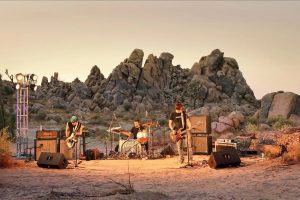
Por las razones que sean, en 2018, llegó el esperado regreso (patentemente más heavy) de Nebula, y ‘Holy Shit’ salió a la calle. Los dos músicos que quedaban de Nebula habían estado tocando juntos durante un tiempo y como ya tenían algunos temas preparados, decidieron que era hora de encontrar un baterista. Justo cuando pensábamos que Nebula no volvería nunca, gracias a la incorporación de Mike Amster (Mondo Generator), el renovado trío nos ha traído albúm tras albúm de un rock desértico de lo menos convencional; más lleno de fuzz y psicodelia que nunca.
Desde entonces, han grabado, al aire libre, unas obras maestras – tanto sonora como visualmente (‘Stoned and Dusted’ y ‘Live in the Mojave Desert’), así como ‘Transmission From Mothership Earth’, su más reciente (y más loco) álbum hasta la fecha.
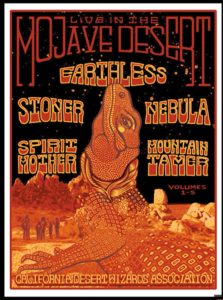
Whatever the reasons were, in 2018, Nebula’s long-awaited (and distinctively ‘heavier’) comeback, ‘Holy Shit’ hit the streets. The remaining duo had been jamming for a while and had come up with some songs and decided it was time to find a drummer.
Just when we thought Nebula would no longer be, thanks to the addition of Mike Amster, (Mondo Generator) the renewed trio has brought us some of the most unconventional, fuzziest, psychedelic desert rock out there, releasing remarkable outdoor masterpieces, both sonically and visually, like ‘Stoned and Dusted’ and ‘Live in the Mojave Desert’, along with their most recent (and most out-there) album to date, ‘Transmission From Mothership Earth’.
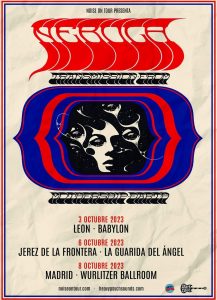
Al parecer, a Nebula les encanta estar de gira y, a lo largo de los años, han compartido cartel con innumerables bandas de muchos géneros (Zen Guerrilla, The Hellacopters, the Bellrays, Earthless, Spirit Mother, Atomic Bitchwax, Electric Wizard, My Sleeping Karma, entre otras). ¡Y este otoño, vendrán a España!
Si nunca has tenido el privilegio de verlos en vivo, ¡no te los pierdas esta vez! Los vi el año pasado, en primera fila, en el festival Sonic Blast y fue la hostia de principio al fin. Aunque, lamentablemente, Davies no estará con ellos este año (está luchando como un jefazo contra la leucemia; hay información debajo de su crowdfunding), no querrás perderte el directo de Nebula.
Eddie Glass es un maestro de los riffs y ya sea que lo llames rock psicodélico, rock espacial, rock stoner o rock del desierto, solo queda clara una cosa: ¡es rock del BUENO!
Nebula apparently love to be on the road, and over the years, they’ve shared bills with a wide array of countless bands, such as Zen Guerrilla, The Hellacopters, the Bellrays, Earthless, Spirit Mother, Atomic Bitchwax, Electric Wizard, My Sleeping Karma and more… And this Fall, they’re coming to Spain!
If you’ve never had the privilege of seeing them live, I urge you not to miss out this time! I saw them just last year, front row, at Portugal’s Sonic Blast festival and my head didn’t stop banging for one second. Even though Davies unfortunately won’t be with them this year (he’s battling leukemia like a pro – see the crowdfunding information below), you REALLY don’t want to miss Nebula’s live show.
Eddie Glass is a riff lord and whether you call Nebula’s rock psychedelic rock, space rock, stoner rock or desert rock, one thing is for sure – it’s GOOD rock!
Nebula: Facebook, Instagram, Official Web
